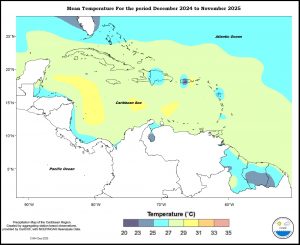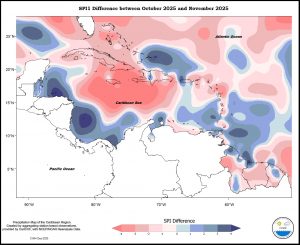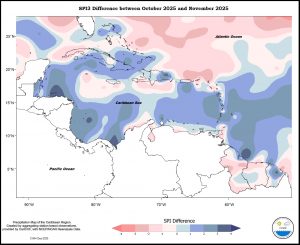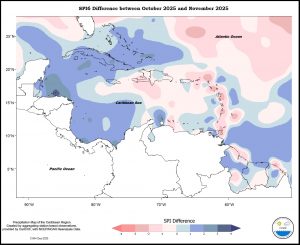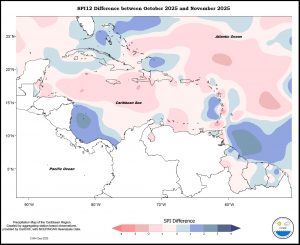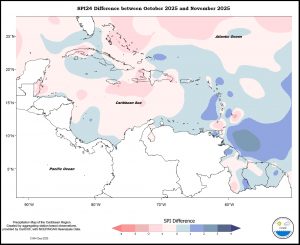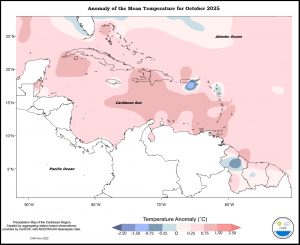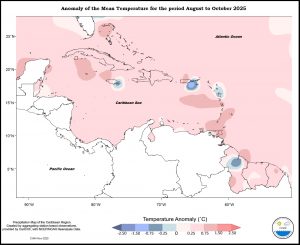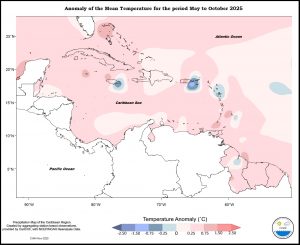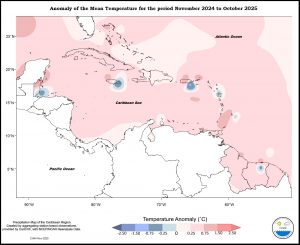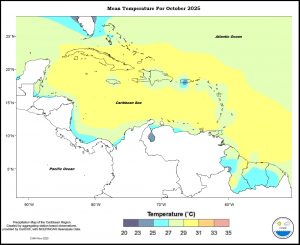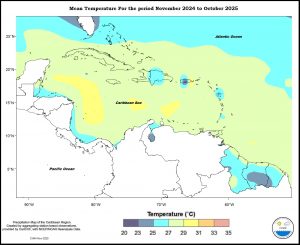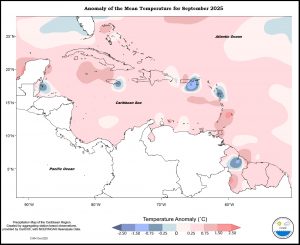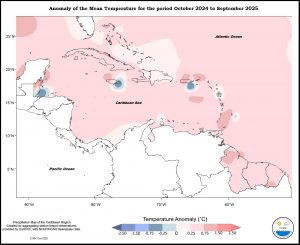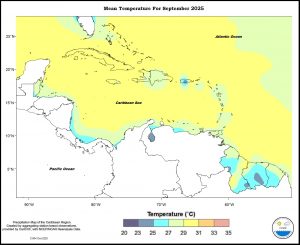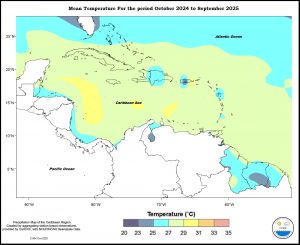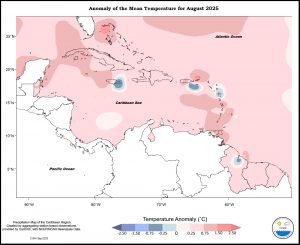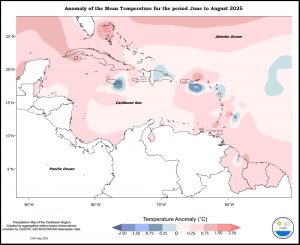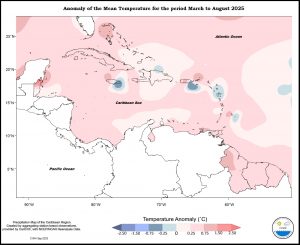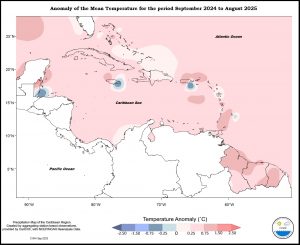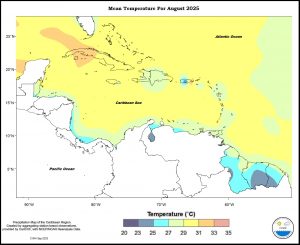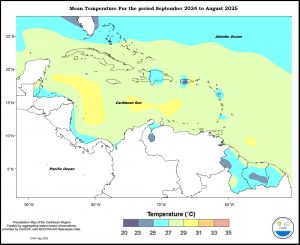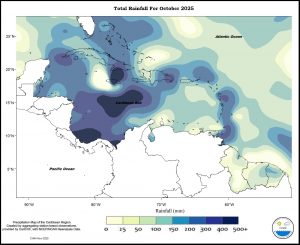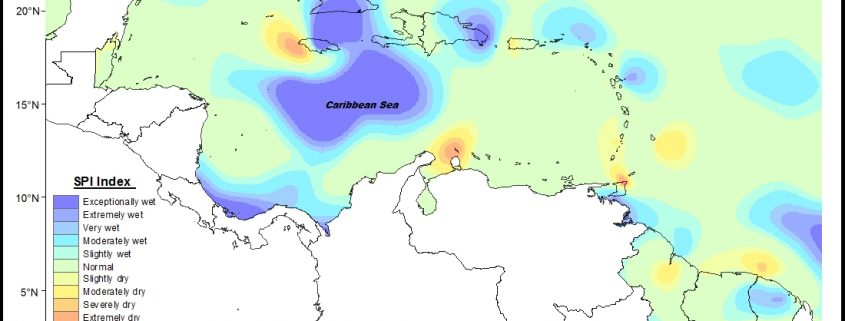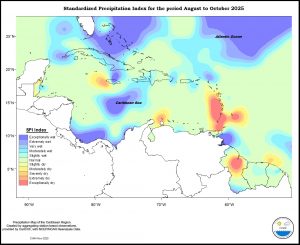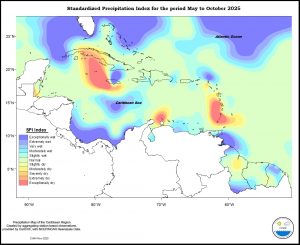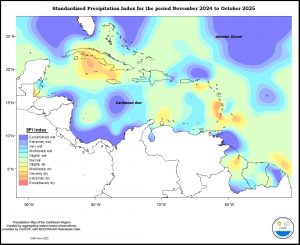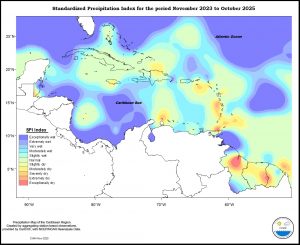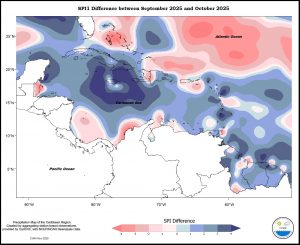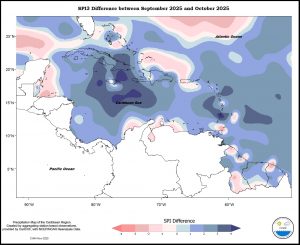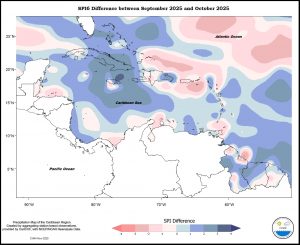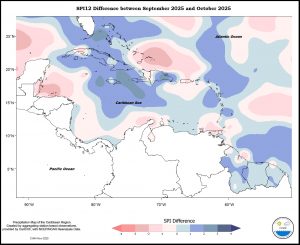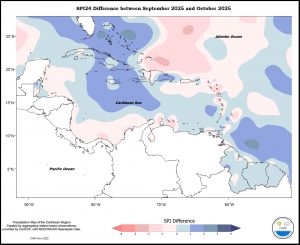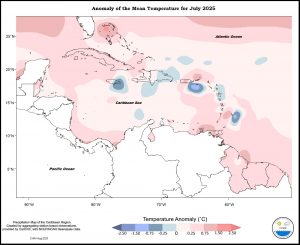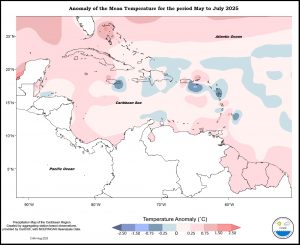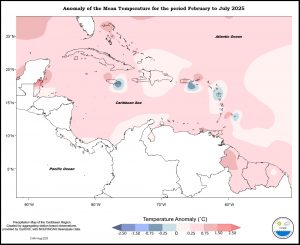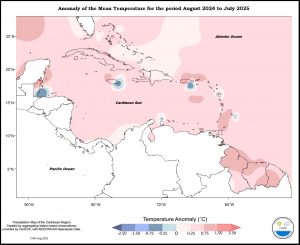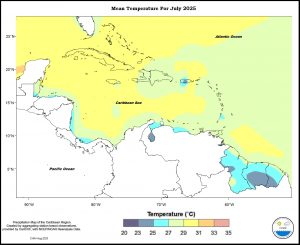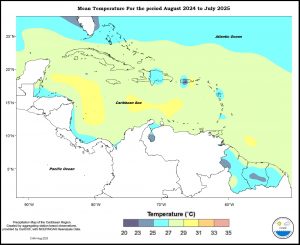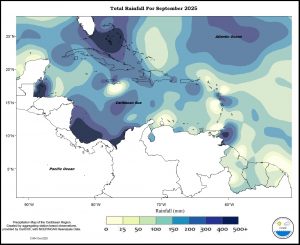Mean Temperature Anomalies November 2025
November 2025
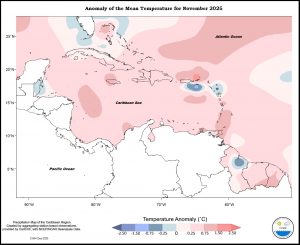 Mixed temperature conditions were experienced during the month of November throughout the eastern Caribbean. Trinidad, Grenada, Barbados and Martinique were between 0.25 to 1.50 o C warmer than average; Saint Lucia was 0 to 1.50 o C warmer; Dominica was 0 to 0.75 o C warmer; Guadeloupe and St Kitts ranged from 0.25 warmer to 0.25 o C cooler; Antigua was 0.25 to 0.75 o C cooler; St Maarten was 0.25 to 0.75 o C warmer; and St Croix from 0 to 0.75 cooler. In the Guianas, conditions ranged from 1.50 warmer in southern portions of French Guiana and Suriname to 0.75 o C cooler in northeastern parts of Guyana. Aruba was between 0.25 and 0.75 o C warmer. Puerto Rico was between 0.25 cooler to 1.50 o C warmer southeast to northwest; The Dominican Republic 0.25 to 0.75 o C warmer; Jamaica 1.50 to 0.25 o C warmer from west to east; Grand Cayman ranged from 0.25 to 0.75 o C warmer; Northern Bahamas 0.25 cooler to 1.50 o C warmer; and Belize was 0.25 warmer to 0.25 o C cooler south to north.
Mixed temperature conditions were experienced during the month of November throughout the eastern Caribbean. Trinidad, Grenada, Barbados and Martinique were between 0.25 to 1.50 o C warmer than average; Saint Lucia was 0 to 1.50 o C warmer; Dominica was 0 to 0.75 o C warmer; Guadeloupe and St Kitts ranged from 0.25 warmer to 0.25 o C cooler; Antigua was 0.25 to 0.75 o C cooler; St Maarten was 0.25 to 0.75 o C warmer; and St Croix from 0 to 0.75 cooler. In the Guianas, conditions ranged from 1.50 warmer in southern portions of French Guiana and Suriname to 0.75 o C cooler in northeastern parts of Guyana. Aruba was between 0.25 and 0.75 o C warmer. Puerto Rico was between 0.25 cooler to 1.50 o C warmer southeast to northwest; The Dominican Republic 0.25 to 0.75 o C warmer; Jamaica 1.50 to 0.25 o C warmer from west to east; Grand Cayman ranged from 0.25 to 0.75 o C warmer; Northern Bahamas 0.25 cooler to 1.50 o C warmer; and Belize was 0.25 warmer to 0.25 o C cooler south to north.
September to November 2025
 Over the three month period temperature conditions were mixed throughout the eastern Caribbean. Trinidad was predominantly between 0.75 and 1.50 o C ranging to 2.50 o C warmer than average in the northeast; Grenada, Barbados and Martinique were between 0.75 and 1.50 o C warmer; Saint Lucia between 1.50 and 0.25 o C warmer; Dominica between 0 to 1.50 o C warmer; Guadeloupe between 0.25 o C warmer to 0.25 o C cooler; Antigua between 0.25 to 0.75 o C cooler; St Kitts between 0 to 0.25 o C warmer; St Maarten between 0.25 to 0.75 o C warmer; and St Croix between 1.50 to 0.25 o C cooler. In the Guianas, conditions ranged between 1.50 cooler in northeastern Guyana to 1.50 o C warmer in northern Guyana and French Guiana. Aruba was between 0.25 to 0.75 o C warmer. Puerto Rico ranged between 0.75 cooler to 1.50 o C warmer southeast to northwest; The Dominican Republic 0.25 to 0.75 o C warmer; Jamaica 0 to 1.50 o C warmer; Grand Cayman 0.75 to 1.50 o C warmer; Northern Bahamas 0.75 cooler to 1.50 o C warmer and Belize 0 to 0.75 o C warmer.
Over the three month period temperature conditions were mixed throughout the eastern Caribbean. Trinidad was predominantly between 0.75 and 1.50 o C ranging to 2.50 o C warmer than average in the northeast; Grenada, Barbados and Martinique were between 0.75 and 1.50 o C warmer; Saint Lucia between 1.50 and 0.25 o C warmer; Dominica between 0 to 1.50 o C warmer; Guadeloupe between 0.25 o C warmer to 0.25 o C cooler; Antigua between 0.25 to 0.75 o C cooler; St Kitts between 0 to 0.25 o C warmer; St Maarten between 0.25 to 0.75 o C warmer; and St Croix between 1.50 to 0.25 o C cooler. In the Guianas, conditions ranged between 1.50 cooler in northeastern Guyana to 1.50 o C warmer in northern Guyana and French Guiana. Aruba was between 0.25 to 0.75 o C warmer. Puerto Rico ranged between 0.75 cooler to 1.50 o C warmer southeast to northwest; The Dominican Republic 0.25 to 0.75 o C warmer; Jamaica 0 to 1.50 o C warmer; Grand Cayman 0.75 to 1.50 o C warmer; Northern Bahamas 0.75 cooler to 1.50 o C warmer and Belize 0 to 0.75 o C warmer.
June to November 2025
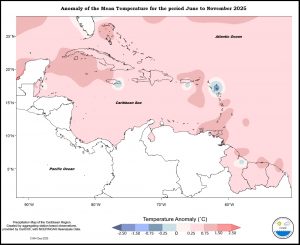 Temperatures throughout the eastern Caribbean were predominantly warmer than average over the six month period. Trinidad, Grenada, Martinique and St Croix ranged from between 0.75 to 1.50 o C warmer; Barbados between 0.25 to predominantly between 0.75 and 1.50 o C warmer; Saint Lucia and Dominica between 0.25 to 0.75 o C warmer; Guadeloupe between 0.75 warmer to 0.25 o C cooler; Antigua between 0.75 to 0.25 o C cooler; St Kitts between 0.25 cooler to 0.25 o C warmer and St Maarten between 0 to 0.75 o C warmer. Conditions in the Guianas were predominantly between 0.25 and 0.75 o C warmer ranging up to 0.25 o C cooler in northern Guyana and to 1.50 o C warmer in northern Guyana and French Guiana. Aruba was between 0.25 and 0.75 o C warmer. Puerto Rico ranged from 0.25 cooler to 1.50 o C warmer southeast to northwest; The Dominican Republic between 0.25 to 0.75 o C warmer; Jamaica between 1.50 warmer to 0.25 o C cooler; Grand Cayman 0.75 and 1.50 o C warmer; Northern Bahamas 0.25 to 1.50 o C warmer and Belize between 0.25 and 0.75 o C ranging up to 1.50 o C warmer.
Temperatures throughout the eastern Caribbean were predominantly warmer than average over the six month period. Trinidad, Grenada, Martinique and St Croix ranged from between 0.75 to 1.50 o C warmer; Barbados between 0.25 to predominantly between 0.75 and 1.50 o C warmer; Saint Lucia and Dominica between 0.25 to 0.75 o C warmer; Guadeloupe between 0.75 warmer to 0.25 o C cooler; Antigua between 0.75 to 0.25 o C cooler; St Kitts between 0.25 cooler to 0.25 o C warmer and St Maarten between 0 to 0.75 o C warmer. Conditions in the Guianas were predominantly between 0.25 and 0.75 o C warmer ranging up to 0.25 o C cooler in northern Guyana and to 1.50 o C warmer in northern Guyana and French Guiana. Aruba was between 0.25 and 0.75 o C warmer. Puerto Rico ranged from 0.25 cooler to 1.50 o C warmer southeast to northwest; The Dominican Republic between 0.25 to 0.75 o C warmer; Jamaica between 1.50 warmer to 0.25 o C cooler; Grand Cayman 0.75 and 1.50 o C warmer; Northern Bahamas 0.25 to 1.50 o C warmer and Belize between 0.25 and 0.75 o C ranging up to 1.50 o C warmer.
December 2024 to November 2025
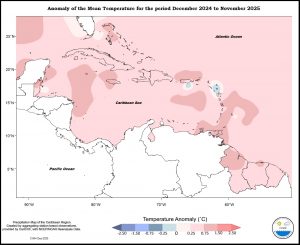 Over the twelve month period temperatures throughout the eastern Caribbean were predominantly warmer than average except for Antigua which was 0 to 0.25 o C cooler. Trinidad and St Thomas ranged from between 0.75 to 1.50 o C warmer; Grenada, St Croix and St Maarten between 0.25 and 0.75 o C warmer; Barbados and Martinique between 0.25 to predominantly between 0.75 and 1.50 o C warmer; Saint Lucia and Dominica between 0 to 0.75 o C warmer; Guadeloupe between 0 and 0.25 o C warmer ranging up to 0.75 o C warmer in the south and to 0.25 o C cooler in the north and St Kitts 0 to 0.25 o C warmer. In the Guianas, the temperatures were between 0.25 to 1.50 o C warmer. Aruba was 0.25 to 0.75 o C warmer. Puerto Rico ranged from between 0.25 cooler to 1.50 o C warmer southeast to northwest; The Dominican Republic 0.25 to 0.75 o C warmer; Jamaica 1.50 to 0.25 o C warmer west to east; Grand Cayman 0.75 to 1.50 o C warmer; Northern Bahamas was 0 to 1.50 o C warmer and Belize 0 to 2.50 o C warmer.
Over the twelve month period temperatures throughout the eastern Caribbean were predominantly warmer than average except for Antigua which was 0 to 0.25 o C cooler. Trinidad and St Thomas ranged from between 0.75 to 1.50 o C warmer; Grenada, St Croix and St Maarten between 0.25 and 0.75 o C warmer; Barbados and Martinique between 0.25 to predominantly between 0.75 and 1.50 o C warmer; Saint Lucia and Dominica between 0 to 0.75 o C warmer; Guadeloupe between 0 and 0.25 o C warmer ranging up to 0.75 o C warmer in the south and to 0.25 o C cooler in the north and St Kitts 0 to 0.25 o C warmer. In the Guianas, the temperatures were between 0.25 to 1.50 o C warmer. Aruba was 0.25 to 0.75 o C warmer. Puerto Rico ranged from between 0.25 cooler to 1.50 o C warmer southeast to northwest; The Dominican Republic 0.25 to 0.75 o C warmer; Jamaica 1.50 to 0.25 o C warmer west to east; Grand Cayman 0.75 to 1.50 o C warmer; Northern Bahamas was 0 to 1.50 o C warmer and Belize 0 to 2.50 o C warmer.
Mean Temperature for November 2025
Mean Temperature for the Period December 2024 to November 2025


